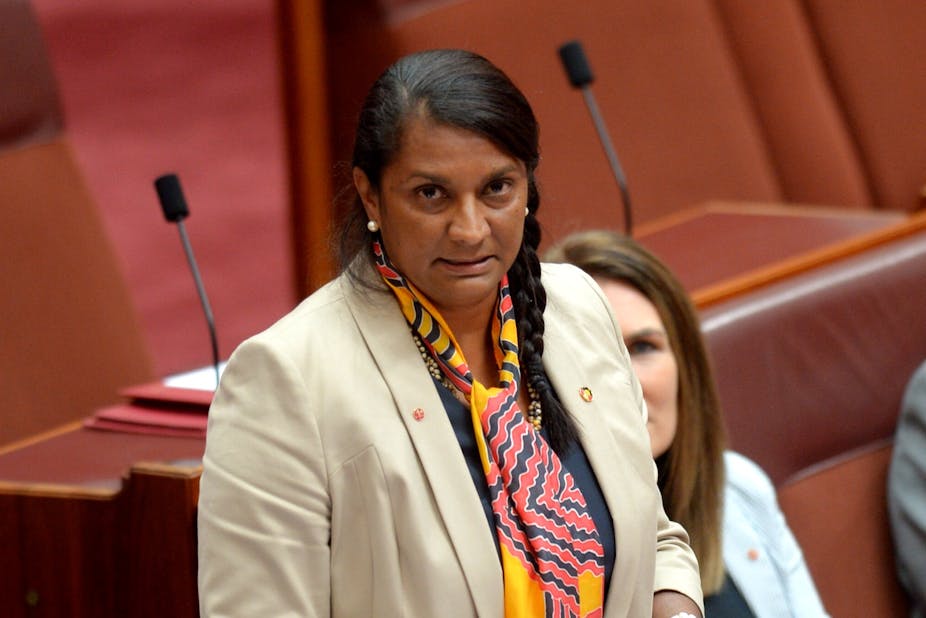Senator Nova Peris’ current travails around the NT News’ publication of intimate emails are a reminder to politicians and public figures everywhere that, like it or not, in today’s news culture there is no such thing as ‘privacy’.
The invisible wall which used to stand between the personal and the public in media coverage of politics, protecting our pollies from the public knowing about their sexual shenanigans in and out of the office, has been eroded by digital technology to the point where it is paper thin and easily torn.
Peris this week finds herself where many have been before her – former US Representative Anthony Weiner (whose globally disseminated tweets of his, well, weiner, ended a promising political career); Bill Clinton of course, who had to bear the entire world discussing his taste for oral sex in the Oval Office; Tony Blair most recently, allegedly involved in some funny business with Rupert Murdoch’s ex-wife Wendi.
Most of these cases have been kiss-and-tell in nature, whereas Peris appears to have been the victim of email theft in the context of a messy custody dispute. That makes her situation different, and attracts a degree of sympathy for her plight. On ABC News this morning, communications minister Malcolm Turnbull defended the freedom of the press, but expressed some concern about the circumstances behind the NT News’s publication of the story.
In substantive terms, there can only ever be one reason or excuse for publishing anyone’s private correspondence, on whatever platform it has been written. That is when the public interest is at stake. In this case, the suggestion that a sexual relationship was behind the taxpayer funding of a foreign athlete’s visit to these shores in 2010 would, if it were true, fit that criterion.
This is not to pass moral judgement on Peris, or any other politician who has an extramarital affair. It was Clinton who said, with some authority, that ‘no-one knows what goes on in someone else’s marriage’. Let he, or she, who is without sin throw the first stone.
But if public monies are being used to pursue a private affair – if, for example, a politician persuades a public body to pay for his overseas lover to attend an event in his country, solely or primarily in order to facilitate the sexual relationship – that would be wrong in any reasonable person’s estimation, and would justify publication of any correspondence which showed it to be the case.
Australian politicians play too fast and loose with their expenses, as we’ve seen in several examples in the last couple of years, and I for one regard it as entirely proper for a news organisation to expose them, using private correspondence if necessary. You want to bring your wife on business class to a wedding in Cairns, (now former) WA Liberal MP Don Randall? Be my guest, but don’t expect the taxpayer to shell out for the $6000 cost.
The rights and wrongs of a case are not always clear, of course, and the politician should have the benefit of the doubt like any other citizen. What if someone’s privacy is violated, and then it turns out that no rule or law was broken? That can’t be right. We wish Peris well in proving that she did no wrong in this matter.
The problem, and here I return to my opening point, is that there can be no privacy for public figures in the digital age, not really. News media have always loved a sex scandal, but now they inhabit a world of digitised, networked communication channels through which everything is potentially public, and information travels at the speed of light, across all borders real and virtual.
When lovers and friends fall out, and when there are skeletons in the cupboard, the online environment is leaky and unforgiving. An affair is, in most cases, a short-lived thing, but emails are forever. Somewhere in cyberspace they exist, forgotten and neglected, until the day comes when some story-hungry news editor, responding to an offer by some disgruntled lover or husband or wife, brings them out and lays them before a slavering public.
The lesson for our public figures is simple – whatever you write, and whomever you write it to, on whatever subject, should be regarded as a public document open to media scrutiny in the future, even if it is a private correspondence. If Barry O’Farrell had applied that principle when writing a letter of thanks for his $4000 gift of wine from a water company, he would still be premier of New South Wales.
Peris joins the ranks of public figures who have neglected rule number one of modern media life – if you don’t want it to come out, don’t write it down. If you do write it down, be prepared to defend it when the time comes, as it inevitably will.

